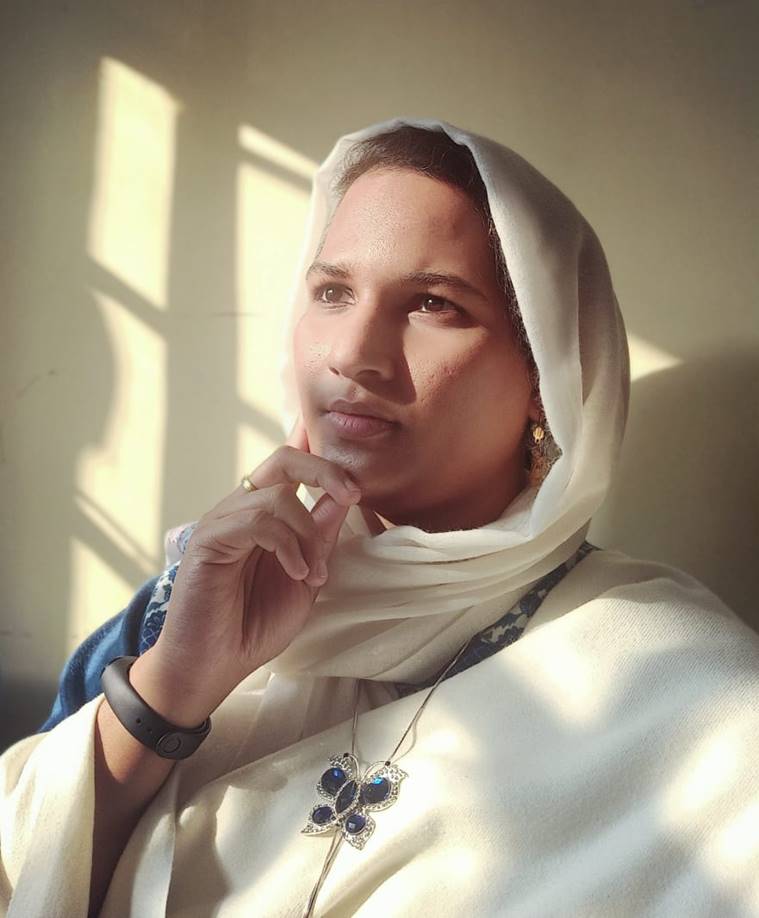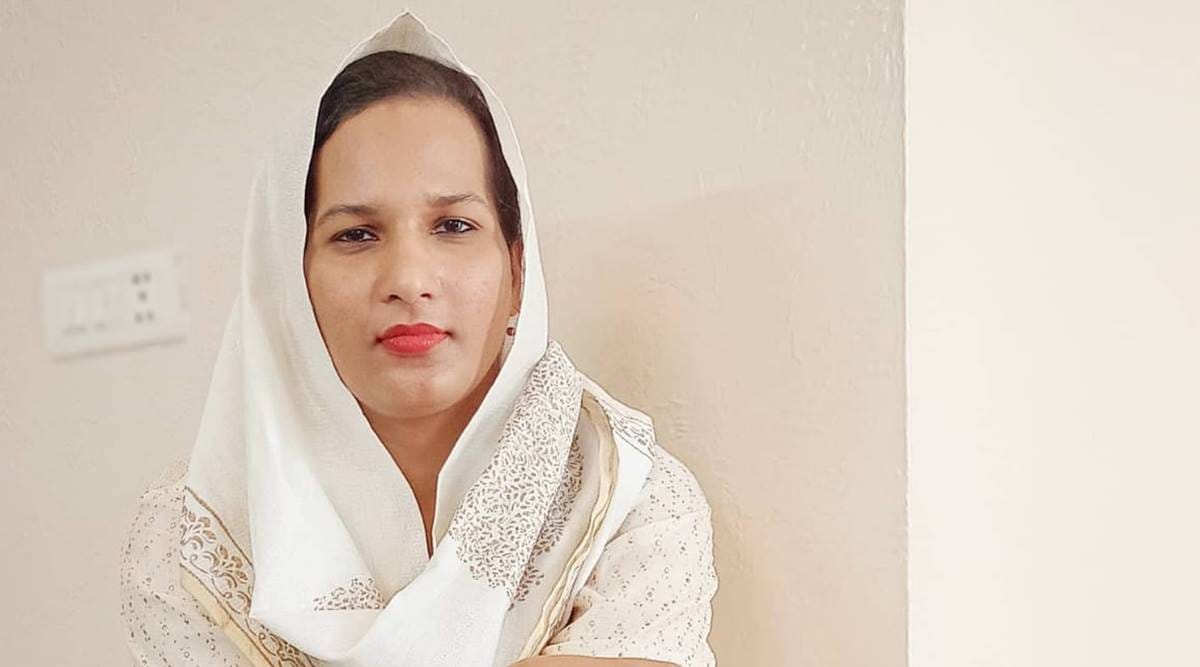‘Feels great to be India’s only transgender person to head a Covid vaccine centre’: Dr Aqsa Shaikh
Appointed as the nodal officer for Covid Vaccination Centre, Hamdard Institute of Medical Sciences and Research, Dr Aqsa Shaikh says it is a step towards spreading hope among people who are distressed due to the pandemic.
Accepting her identity as a transwoman at the age of 20, was a journey in itself for Dr Shaikh. But she says it brought her “relief”. Thereafter, she has had her share of experiences, challenges and learnings, and has only emerged stronger through it all.
Currently, Dr Shaikh has been roped in as one of the investigators in the clinical trial of Sputnik V. She is also working as an investigator in TransCare Project, and WHO Unity Studies on Covid. She believes she is “empowered” but emphasises that there is a lot more to be done for transgender rights.
The doctor, who is going through gender reassignment surgery, speaks with indianexpress.com about why she thought it was needed, apart from addressing other issues like workplace discrimination and pandemic-induced hardships for transgenders.
Excerpts:
You are heading a Covid vaccination centre. What do you think about the opportunity?
It’s a great feeling to be India’s only transgender person to have reached this position of heading a Covid vaccination centre. I remember when we started in January 2021 and the first few shots of vaccines were given, the exuberance and the euphoria which was there was phenomenal. At the same time, it has also helped me serve thousands of people and touch their lives.
Being the nodal officer of a vaccination centre has given me the opportunity to break a lot of myths and misconceptions, dispel rumours and spread positivity. It has been a great experience and a very fulfilling one.
 “During any crisis, the stigmatisation and discrimination increases especially against the marginalised communities and the same happened with the transgender community,” says Dr Shaikh. (Source: Dr Shaikh)
“During any crisis, the stigmatisation and discrimination increases especially against the marginalised communities and the same happened with the transgender community,” says Dr Shaikh. (Source: Dr Shaikh)
The pandemic has been hard on all of us. What, according to you, are some of the challenges transgenders faced amid the pandemic in terms of access to health services, jobs, etc.?
While the pandemic has been hard on us, we cannot say the level of hardship was equal for all. To say that it has been a great equaliser would be doing injustice to those who have suffered disproportionately higher and one such group is the transgender community. Even during the pre-pandemic times, the community depended on their traditional professions like begging, giving badhai or sex work and all of these professions came to a standstill during the nationwide lockdown. Most of the transpersons, therefore, lost their means of livelihood.
When it comes to access to healthcare services, it is anyway difficult for the transgender community during usual times and to imagine how they might have accessed these services during the pandemic! Even if it meant a checkup for something as simple as fever, which was difficult. A lot of hospitals were converted into Covid dedicated centres and therefore even the number of facilities available for them decreased.
During any such crisis, the stigmatisation and discrimination increases especially against the marginalised communities and the same happened with the transgender community. So the opportunity to go for dignified and affordable healthcare services was drastically reduced. We saw how the transgender community found it extremely difficult to access testing services, Covid isolation facilities divided into the binaries of males and females. We also saw how they were left lagging behind in the first few phases of vaccination — from booking slots to IDs with respect to use of name and genders, which is why the vaccination rate in the trans community has been four times lesser than the cisgender community.
What are your pandemic learnings?
To value the right things. The pandemic taught us how temporary our life can be and therefore how we should really value the things that matter and not the materialistic things. It also taught us that when you are left without much government support, how we can all support each other through human solidarity. The pandemic showed both the beautiful and the ugly faces of humanity.
You came out at 20. For someone as young, was it difficult to accept your identity?
While I was aware of my gender identity from the times my memories are, it was around the age of 20 when I finally got a complete understanding of who I am — I am not a gay man but a transgender woman. In fact that ended the confusion or dilemma that I had for 15 years of my life, trying to figure out who I am. So that was actually a moment of relief when I got my gender identity.
Has the family supported you?
It is difficult for families who, for example, have raised a boy for 20 years, to come to terms with the fact that the boy actually identifies as a girl, and wants to transition biologically, legally and socially as a woman. It is difficult for them, it’s also a journey for them. When it comes to acceptance from my family, it is not a one-day process but a journey. We have been on this journey. There has been an increasing amount of acceptance and support from the family. My mother lives with me now. Also, there is an extended family beyond the blood relations — the one you create with friends and near and dear ones. And that family has been extremely supportive of my endeavours and have been holding an umbrella for me on my bad rainy days.
You have also been undergoing gender reassignment surgery. Why was it important to you?
When it comes to transitioning, there are a lot of procedures that are done. And I have been going through some of them like hormone replacement therapy, laser hair reduction, and surgeries. When it comes to gender reassignment surgeries, I am also a work-in-progress. A lot of transgender persons have dysphoria or severe discomfort or hatred for the body that they do not identify with and I had the same. This was relieved to a great extent by hormone replacement therapy by nonetheless, it is there. That’s why these surgeries are so vital to get rid of dysphoria which is also one of the causes of suicide amongst transgender persons.
In a country still fighting discrimination on the basis of gender, how have things been for you in the workplace and otherwise?
In India, we still haven’t given rights to women, the gender that we accept exists, forget talking about the rights of transgender persons. When it comes to the education sector or workplace, there are always challenges. Some of the corporates celebrated Pride Month. You have those flashy neon signs all around but that’s not enough. We need to do more. We are demanding reservations in government jobs, on par with the OBCs. We have been asking for bodily rights against sexual harassment at workplaces. We are asking for rights for inclusion in the internal complaints committee at workplaces, and most importantly for equal opportunity. I consider myself quite privileged and empowered in the sense that I am in a senior position and therefore not discriminated against so much. But as transgender doctors, we all have our share of disappointments in the sense that some people think my medical advice is inferior to a man or woman’s advice. But it is best to ignore them and keep forging our path ahead and that’s what I have been doing.
For more lifestyle news, follow us: Twitter: lifestyle_ie | Facebook: IE Lifestyle | Instagram: ie_lifestyle
For all the latest lifestyle News Click Here

